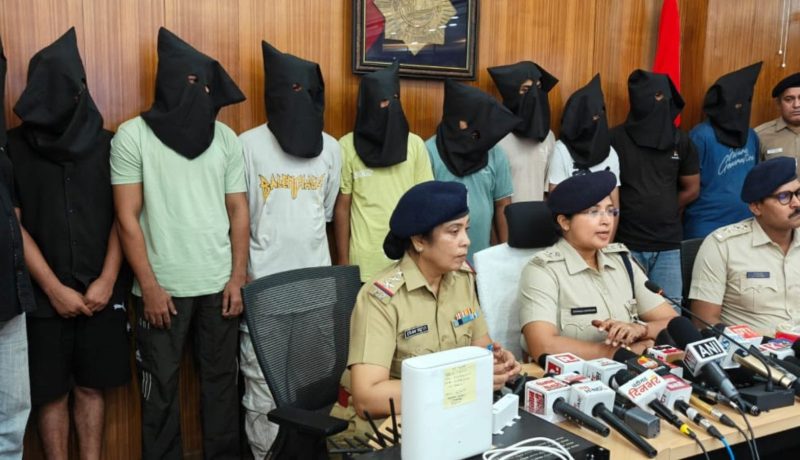
SIM boxes, 2 lakh calls and threats: Chandigarh Police bust digital arrest ‘scam’, arrest 10 | Chandigarh News
The Chandigarh Police said Friday they have busted a sophisticated digital arrest “scam” operated by a transnational cybercrime syndicate based in Cambodia and other Southeast Asian countries, with the arrest of 10 people across Punjab and Uttar Pradesh.
Officers of the Cyber Crime Police Station arrested the suspects after lodging a First Information Report (FIR) registered on July 21 under various sections of the Bharatiya Nyaya Sanhita (BNS). They also said Rs 36.98 lakh has been frozen across various bank accounts linked to the suspects.
They said details of the accused and the equipment they seized have been shared with the Indian Cyber Crime Coordination Centre (I4C) to determine their possible links with other cybercrime cases across India.
The police said the alleged scam came to light after Manjeet Behl, a senior citizen and wife of late Brigadier Amarjit Singh Behl, lodged a complaint, saying she was duped of Rs 1.01 crore after being threatened on a voice call, followed by a WhatsApp video call from someone posing as a CBI officer.
The caller falsely accused her of being involved in a money laundering case linked to her Aadhaar number and bank details. The fraudsters shared fake documents, including forged government notices and a fabricated bank passbook, with her.
During the video call, a fake police station setup was displayed to intimidate her into transferring her life savings into accounts claimed to be for “safe custody.”
Modus operandi
Investigations revealed the alleged scam was being orchestrated from Southeast Asian countries like Cambodia, Laos, Myanmar, and Hong Kong. The fraudsters used devices known as SIM boxes, which can generate lakhs of IVR calls per day by converting internet-based calls into local mobile calls, thereby bypassing telecom tracking.
Story continues below this ad
Geetanjali Khandewal, Superintendent of Police, Cyber Crime, who headed the probe, said victims across India were targeted by people impersonating officials from the Central Bureau of Investigation (CBI), Telecom Regulatory Authority of India (TRAI), or courier companies like FedEx, and each SIM card plugged into these devices could make over 1,500 calls per day.
According to the police, Indians were lured via Facebook and Telegram with promises of work-from-home jobs. They were then recruited to operate the SIM boxes by providing internet connectivity, uninterrupted power supply, and SIM cards, with all activity monitored remotely by foreign handlers through Telegram groups.
Fake point of sale operations
Acting on technical leads and approvals, Chandigarh Police launched a series of coordinated raids in Meerut, Ludhiana, and Amritsar.
In Meerut, Parvez Chauhan was arrested with a SIM box, Wi-Fi router, and over 70 SIM cards. He admitted to earning 50 USDT per day in cryptocurrency for routing international scam calls.
Story continues below this ad
In Ludhiana, Vijay Kumar Shah and Krishna Shah, two men of Nepalese origin, were arrested for their fraudulent point-of-sale (PoS) operations where they activated multiple SIMs using one customer’s KYC without their knowledge. These SIMs were later sold to Akash Kumar, who distributed them further.
The police then arrested Suhail Akhtar, who confessed to purchasing SIMs from Kumar, and supplying them to Shubham Mehra alias Sunny. They searched a rented property in Amritsar where Mehra was operating a SIM box facility. The police seized six high-end SIM boxes (Dinstar brand), over 400 SIM cards, 11 mobile phones, laptops, routers, and modems.
The police said Mehra admitted he was recruited through a Facebook ad and Telegram by foreign nationals, and was paid Rs 25,000 in cash monthly for managing the infrastructure.
The chain extended to Ajit Kumar, Vipin Kumar, Saroj Kumar, and Abhishek Kumar, who were involved in sourcing and financing the illegal SIM operations. Vipin provided financial backing, while Saroj and Abhishek, both PoS agents, activated SIMs, which were later used in cyber frauds.
Story continues below this ad
The police said their probe also revealed a human trafficking angle. Between 2022 and 2025, nearly 3,000 Indian citizens were rescued from countries like Cambodia and Laos, where they had been lured by fake job offers and forced to operate cyber scams under duress, including the digital arrest model.







No Comment! Be the first one.